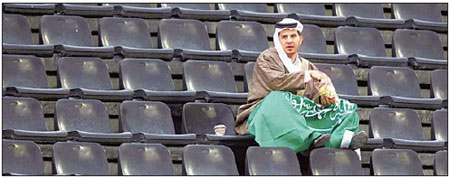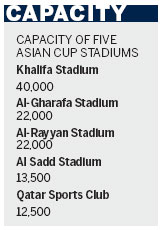Center
Qatar struggles to fill Cup seats
Updated: 2011-01-20 08:01
By Tang Zhe (China Daily)
|
A fan of Saudi Arabia sits in the stands before its Asian Cup Group B match against Japan at Al Rayyan stadium in Doha on Monday. Fahad Shadeed / Reuters |
Host nation starts to feel World Cup pressure despite its home team advancing to the final eight
|
|
DOHA - After finishing second in Group A and advancing to the last eight, Qatar finds itself in a bind as it now looks at packing more than 30,000 fans into the 22,000-seated Al-Gharafa Stadium for its quarterfinal clash against Japan on Friday.
The problem of filling the empty seats at the other stadiums for the quarterfinals is also a headache for organizers.
Before the tournament started, Qatar had planned to play all of the host team's games at the country's largest stadium, Khalifa, which has a capacity of 40,000.
|
|
All of the side's group matches were arranged there, as was the quarterfinal between the Group A winner and Group B runner-up, as well as a semifinal and the final.
But a miserable opening game loss to Uzbekistan messed up those plans as Qatar failed to top Group A.
The host has no choice but to play its quarterfinal and possibly semifinal at the smaller Al-Gharafa Stadium.
Khalifa will become another headache for the organizing committee as its empty stands have proved to be an embarrassment for the 2022 World Cup host during the just-completed group stage.
According to official statistics, an average of 11,751 fans have attended the matches to date. The host's three group games averaged 32,087 per game.
The match between Japan and Saudi Arabia had only 2,022 spectators, while Uzbekistan and Kuwait drew 3,481.
Doubts are now growing concerning the host's ability to attract enough fans to the 2022 World Cup.
"About 430,000 tickets have been sold at the moment, and about 9,000 tickets were purchased for the Japan-Saudi Arabia game," Jassim Al Rumaini, spokesperson and operations director of the Qatar Local Organizing Committee (QLOC), said this week. "If people don't show up, we can't force them to come, but we have tried to attract people to the venue to have a good time."
Al Rumaini insisted the tournament was well planned and the 2022 World Cup would be a completely different issue from the Asian Cup.
"We have facilities and we have fans. We are planning very well," he said. "If you compare the ticket sales to previous tournaments, you will find they are up to the standard as we expected.
"These are different issues. A lot more people will come to the World Cup," he said. "I know this is also a big tournament, but there are different evaluations. If we have 2,000 media come to Doha (for the Asian Cup), we will have 10,000 in 2022."
Without detailing annual statistics, Al Rumaini announced about 44,000 people had come to Doha as visitors from Dec 1 to Jan 18, among which 7,000 people had arrived just for the Asian Cup.
"I think 44,000 people in 45 days is a big number for Qatar," he said. "The teams' performances will attract people and I am sure we will have more spectators coming to the stadiums during the knock-out round."
Another strange phenomenon in Doha is a lack of Asian Cup licensed products, such as caps, scarves and souvenirs.
"The AFC (Asian Football Confederation) is in charge of the merchandise and it is not allowing this (selling)," said AFC tournament operator Tokuaki Suzuki. "We tried to convince them to let us have the merchandise, but we are not responsible for sales."
Meanwhile, in an earlier interview with Sky News, AFC President Mohamed Bin Hammam ruled out shifting the 2022 World Cup in Qatar to winter or staging tournament matches in neighboring Qatar.
That declaration could be regarded as a political maneuver as the Qatari is expected to challenge FIFA President Sepp Blatter at elections in May.
"I believe Qatar can stand alone and organize the competition by itself," Bin Hammam said. "And I'm really not very impressed by these opinions to distribute the games over the Gulf or change the time from July to January - it's actually premature, you know, it's people's opinions and they are just discussing it on no basis and no ground."
China Daily
(China Daily 01/20/2011 page24)
E-paper

Ear We Go
China and the world set to embrace the merciful, peaceful year of rabbit
Preview of the coming issue
Carrefour finds the going tough in China
Maid to Order
Specials

Mysteries written in blood
Historical records and Caucasian features of locals suggest link with Roman Empire.

Winning Charm
Coastal Yantai banks on little things that matter to grow

New rules to hit property market
The State Council launched a new round of measures to rein in property prices.



